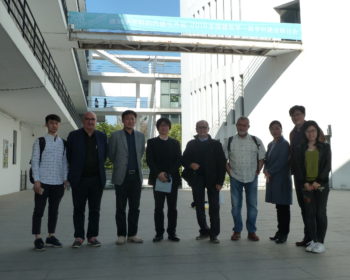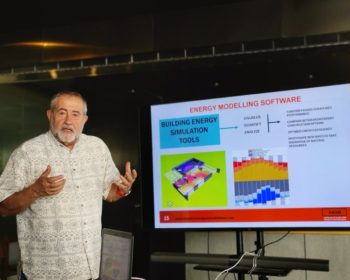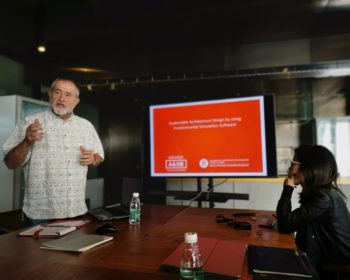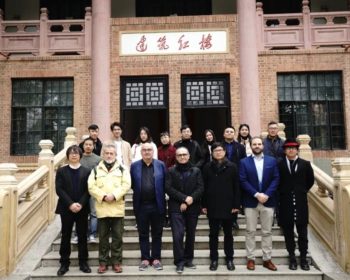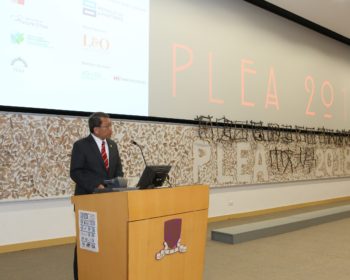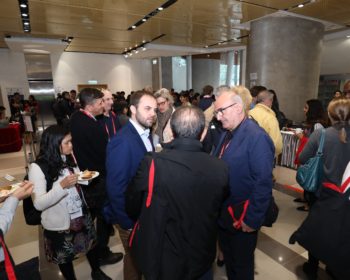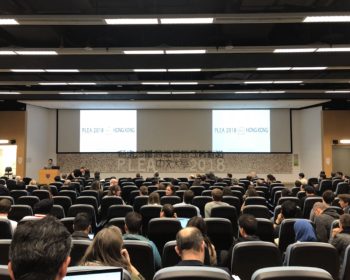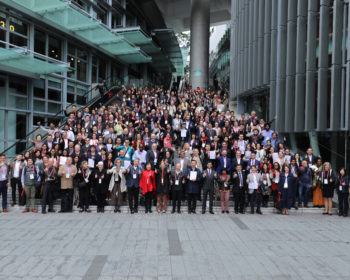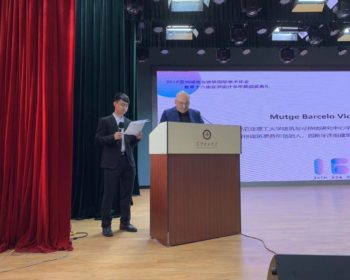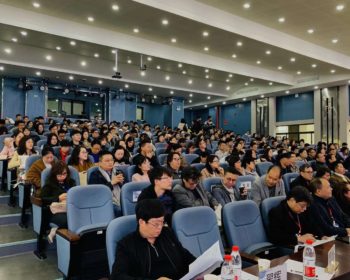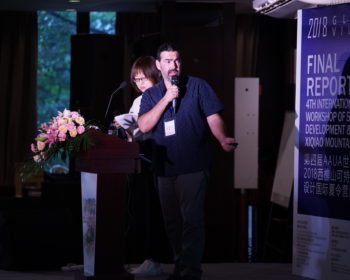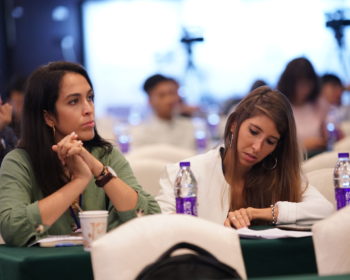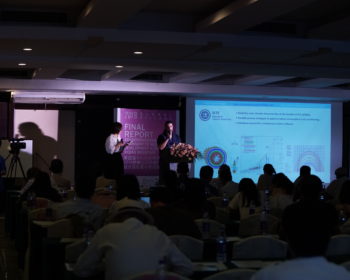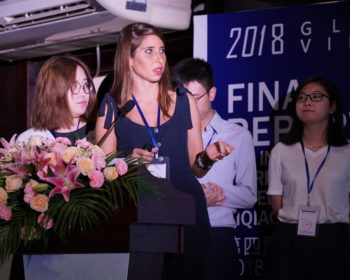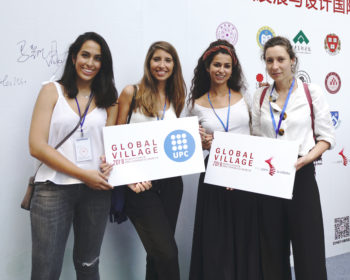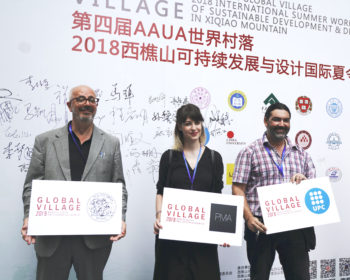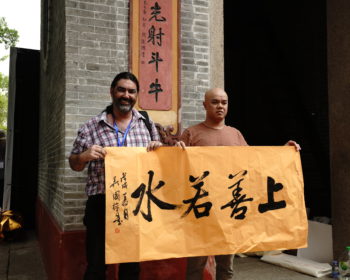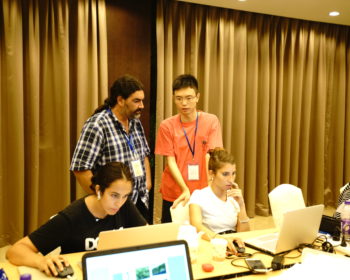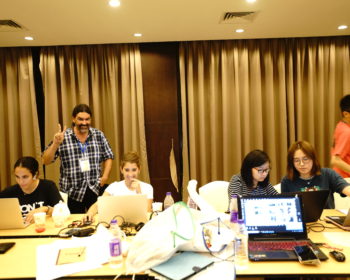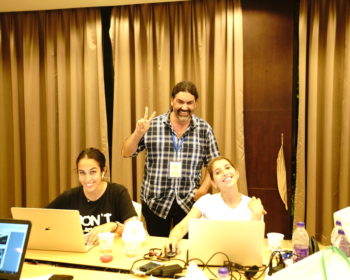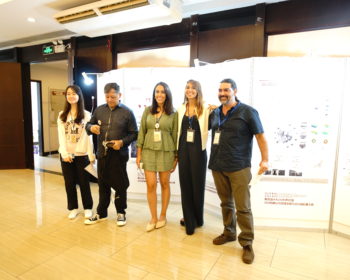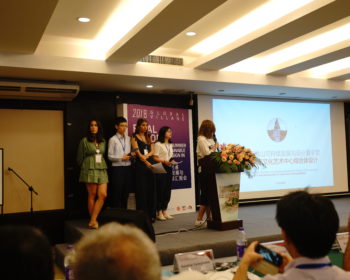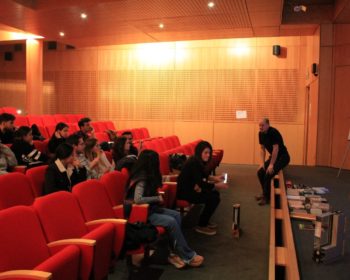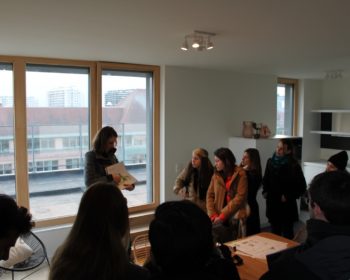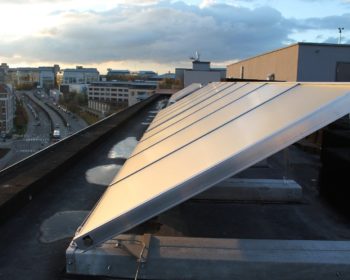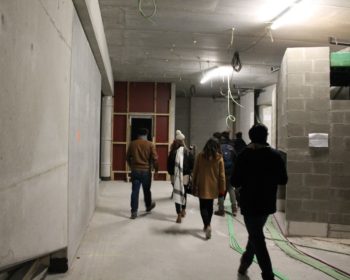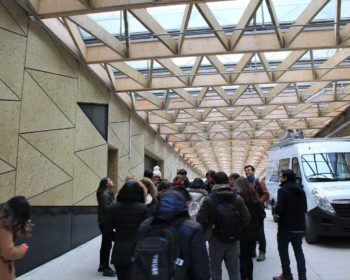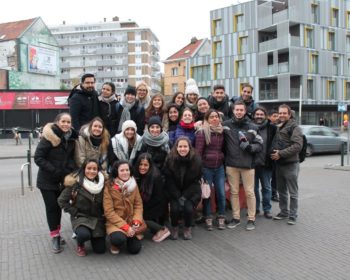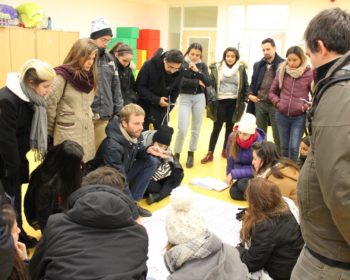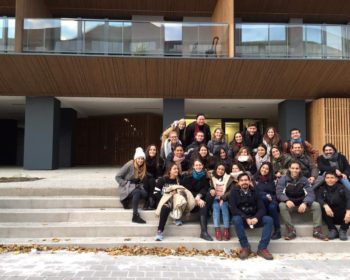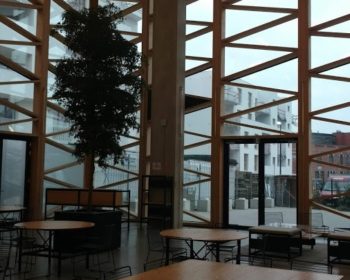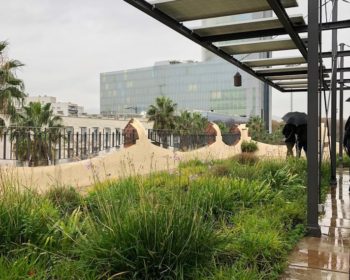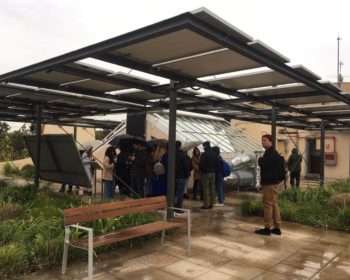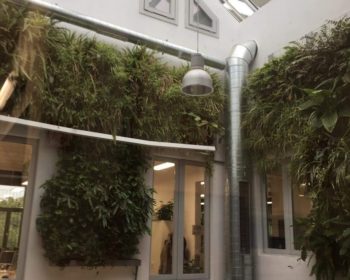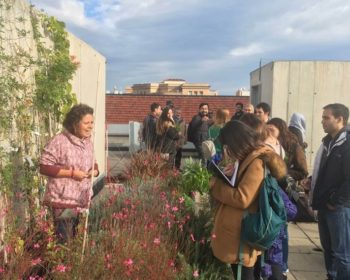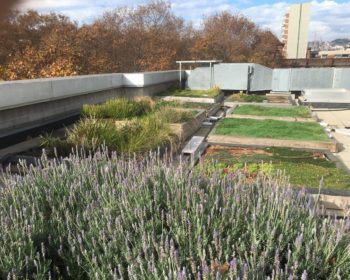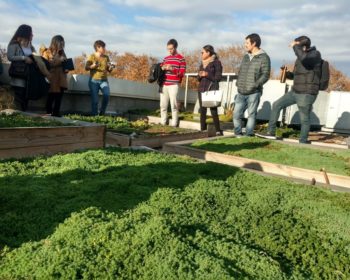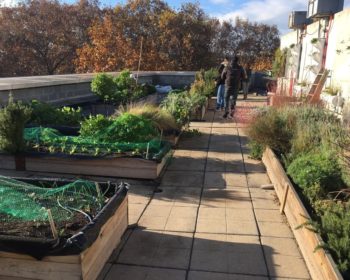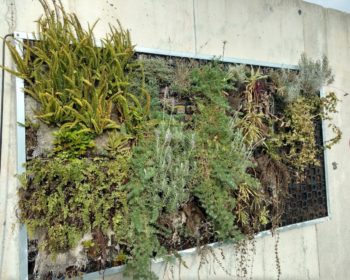A&SB visits lthe universities of Guangzhou and Shenzen (China)
In December 2018 three members of the A&SB group, the professors of the Master degree in Architecture and Sustainability, Ezequiel Uson and Temi Vives, and the architect and ex-alumni of this master degree, Vicenç Mutgé, were invited to visit the South China University of Technology in Guangzhou.
They were received by the professor and doctor Xiao Yiquiang, Deputy Dean of the School of Architecture, and they gave a lecture attended by the staff of professors and students of this School, in which the academic content of the master degree was presented.
In those days they were also invited to visit the School of Architecture and Urban Planning (SAUP) of the University of Shenzen, where they were received by Professor Yuan Lei, director of the SAUP, and during a meeting with the staff of professors of the School of Architecture there was also the opportunity to present the master degree.
The aim of these presentations is to propose the establishment of institutional academic collaborations, in order to be able to internationalize the master and other academic programs.
Participation of A&SB in the PLEA Congress 2018, 34th International Conference on Passive and Low Energy Architecture, in Hong Kong
From December 10th to 12th of 2018, the PLEA International Conference took place at the Chinese University of Hong Kong, which is undoubtedly the most important architectural and sustainability meeting in the world.
This last edition had a very high level, and the participation of A&SB consisted in the presentation of two papers in the Education and Training and Design and Practice sections, which were very well received.
The titles of the two articles presented are ‘Rehabilitation of the public residential public stock of Barcelona applying sustainable strategies. Case study ‘and’ Learning about building technologies for sustainability. Design Guidelines for a Nearly-Zero-Energy residential building in Barcelona, case study.
During the congress, the assistant professors established contacts with other participating universities from all over the world and promoted the Master degree in Architecture and Sustainability of the UPC School among professors and student assistants, verifying that the training provided in this master degree is very advanced, useful for the architectural design and suitable for the challenges that in the field of building and urban planning raises climate change.
The next edition of the PLEA will be in La Coruña (Spain) in September 2020.
4 awards for the Master Degree A&S in the ADA International Competition organized by the Asia Architecture and Urbanism Alliance
The students of the 2017-18 edition of the Master Degree in Architecture and Sustainability (UPC School) participated in the 16th Asian Design Award Competition, organized by the Asia Architecture and Urbanism Alliance, a contest to which we were invited to participate together with other universities around the world.
Within the nine categories proposed, the master’s teams participated in the ‘Ecological, Healthy and Sustainable’ category, adapting the core projects developed during the course to the competition’s bases, to present them in August 2018.
The result of the contest, announced in November, was highly satisfactory for our Master, since four teams of students were awarded:
– 16th ADA (2018) Bronze Award in the Ecological, Healthy and Sustainable category (Alejandro Salazar, Aranza Palomo, Martin Restrepo, Antonio Rodriguez, Silvia Rodriguez, Pablo Rojas and Juan Camilo Salazar).
– 16th ADA (2018) Honorific Mention in the Ecological, Healthy and Sustainable category (Elisea Carrillo, María Paz Eiletz, Macarena Barahona, Ximena Vázquez and Melissa Zeballos).
– 16th ADA (2018) Honorific Mention in the Ecological, Healthy and Sustainable category (Neus Agost, Andrea Gomez, Sara Gonzalez, Christine Montero, Sarai Montiel and Daniela Ruiz).
– 16th ADA (2018) Honorific Mention in the Ecological, Healthy and Sustainable category (Fátima Isabel Castro, Adriel Cusmai, Paula Gerbi, Gustavo Rojo, Sheyla Saleh and Ma. Alejandra Sosa).
In addition to these 3 honorable mentions and 1 bronze for the students, there was also an honorable mention to the project management for the professors of the Master Ezequiel Uson and Alejandro Labeur, and an award for excellent organizational management for the UPC.
The awards ceremony took place on December 2nd 2018 at the Kunming University of Technology (China), during the last day of the Design Principle – Design Perspective on Social Problems event.
A representative of the team of professors and some of the award-winning students had the opportunity to attend the ceremony and collect the prize.
Participation of A&SB in the 2018 Global Village, an international workshop for sustainable development in Xiqiao Town (China)
In August 2018 the A&SB Group (Architecture & Sustainability Research Unit in Barcelona) participated in the Global Village 2018 – 4th International Design Summer Workshop for Sustainable Development in Xiqiao Town (Nanhai District), organized by the Asia Architecture and Urbanism Alliance and the government of Xiqiao Town, among others.
The team of A&SB was formed by Carles Guillén (industrial engineer, expert in bioclimatic software of energy analysis and professor of the master and postgraduate courses of A& B), the architect Ma. Victoria Lo Ré (student of the 2016-17 edition of the Master Degree in Architecture and Sustainability – UPC School) and the architect Andrea Gómez (student of the 2017-18 edition of the Master Degree in Architecture and Sustainability – UPC School).
Taking advantage of the 30th anniversary of the adaptation of the Xiqiao mountain as a tourist area, this workshop proposed to study approaches to boost the local economy through an ecological and sustainable development. In the case of the group in which we participated, it was about designing a museum of art and culture integrated in the typical architecture of the mountain villages of the area, and that at the same time was modular, transportable, sustainable and passive. The workgroup was formed by the alumni of the master degree and by students from Chinese and North American universities.
Those were days of intense work and interesting and enriching experiences, with a lot of fieldwork and cultural exchange.
Passivhaus Seminar 2018
On November 19th and 20th the Passivhaus Seminar was held in 2018 in Brussels, Belgium. This city is recognized for being a pioneer in the use of the Passivhaus standard, a passive construction and energy saving methodology. The students of the Master of Architecture and Sustainability had the opportunity to visit buildings in different stages of construction, from buildings on site, to facilities in use.
On the first day, in the morning, the students attended a conference on concepts and materials applied mainly in the Passivhaus buildings, in the CIVA Foundation, in charge of Architect Jeroen Poppe. In the afternoon, we visited the Woluwe MT200 building, a residential building recently finished and actually in use, accompanied by the Architect Marieke Landron and the Hotel BARA, which is in the construction stage, accompanied by the Architect Laura Rooth, both from the A2M office.
On the second day of the tour, the first building in the morning, was the Greenbizz building accompanied by the architect Sabine Leribaux, from the Architectes Assoc firm; it is a model building of business incubators, which allowed the development of the urban area. Then, we went to the construction of the expansion of an elementary and kínder garden in Waterloo, accompanied by the Architect Delphine Derbaudrenghien of Trait Architects.In the afternoon, two buildings of the R2D2 office was visited, guided by Arch. Pieter De Groeve. The students attended the Piers – Schmitz housing building and the children’s nursery, Hectolitre, both already in use.
It is worth highlighting, not only the good predisposition of the students in all the visits, but the importance of all the concepts exposed by the professionals who guided and accompanied us during the Tour. That is why from the staff of the Master Architecture and Sustainability we want to thank you all.
Visit to La Fábrica del Sol in Barcelona
On Friday 11.23.2018 the students of the Master of Architecture and Sustainability visited La Fabrica del Sol, this is an environmental educational facility owned by the town hall and promoted by de Department of Ecology, Urbanism and Mobility of the Barcelona City Council.
This is a modernist building from 1907, it was designed by the architect Josep Domènech i Estepá for the Catalan Gas department; and in 1995 it was acquired by the City Council of Barcelona to be restored. The building is included in the Architectural Heritage Catalog.
The building was rehabilitated with environmental concepts, like the reuse of the rainwater, an interior vertical garden, the use of photovoltaic panels and air conditioning by natural ventilation.
The terrace is the center of the building, there you can observe, and enjoy, most of the strategies, a gallery made with photovoltaic panels that produce energy for the building, a floating pavement that is a reservoir of rain water to be used by the toilets and a green roof that provides insulation and benefits to the Urban biodiversity.
Inside the building there is a public library with ecological and environmental books as well as testing instrumental that can be rented. There is also, a permanent exhibition room with interactive screens and samples of different sustainable materials. The objective of La Fabrica del Sol is to raise awareness about renewable energy and sustainability.
Visit to the experimental green roof of the Pompeu Fabra University, in the Ciutadella Campus
Last Friday 11.30.2018 the students of the Master of Architecture and Sustainability visited the experimental green roof in the Campus of the Pompeu Fabra University in Barcelona, accompanied by Lidia Calvo, industrial engineer, and Gina Calvo, graphic designer and gardener, both part of the Eixverd team responsible for the development and investigation of this roof.
During the visit, it was possible to observe different configurations of green roo
fs, composed by different materials and types of vegetation. The objective is to measure energy efficiency and the response to weather, of each type of green roof.
Different solutions of price, water requirements, energy efficiency, water retention capacity and the capacity to filtering atmospheric contaminating materials, were compared.
They also have experiments of agricultural roof with different substratum commonly used in traditional orchard, testing the drainage, their weight, the stability of the plant and their productivity, to be later considered as a possibility for urban orchards.
We arrived to some of this conclusions, about green roofs:
- They help to decrease the urban heat island effect.
- There is a reduction of carbon emissions, thanks to using these roofs.
- They are beneficial to the Urban biodiversity.
- They provide thermal and acoustic insulation.
- They assist in the absorption of contaminating particles.
- They promote Urban agriculture in the big cities.
- They provide a longer life to the roof.
Experiments allow to study and investigate about different types and possibilities to make more effective sustainable designs.
